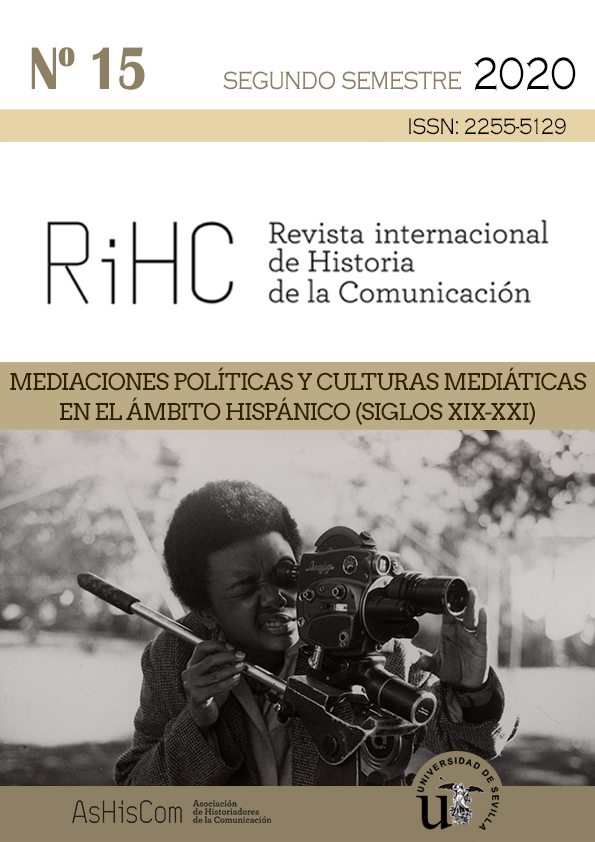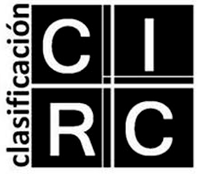Spanish film in Argentina: the export of ruralist nationalism
DOI:
https://doi.org/10.12795/RiHC.2020.i15.03Keywords:
Cine, Franquismo, Peronismo, Drama rural, CronotopoAbstract
The first Francoism created a film policy based on autarky, that is, on strict control of foreign trade for both economic and ideological reasons. It was necessary to control the balance of payments and the ideology of foreign governments. This is how, after the Second World War, Argentina became the main partner of the regime. Above all because the importation of cereals is vital to alleviate hunger. Moreover, to solidify these relationships, a cultural exchange is encouraged in which the cinema plays an important role. Specifically, the purpose of these pages is to study the commercial, artistic, moral, and critical impact of the Spanish rural drama exported by Spain to Argentina in the period from 1944 to 1947. It is intended to show that this cinema served to disseminate the national ruralist ideology among Argentines and, above all, among the colony of Spanish emigrants, many of them from the countryside.
Downloads
References
ALTHUSSER, L. (1989): «Ideología y aparatos ideológicos del estado», en La filosofía como arma de la revolución, México, Siglo XXI, pp. 102-151
BAJTIN, M., (1989): Teoría y estética de la novela, Madrid, Taurus.
BERGER, P. L. & Luckmann, T. (1986): La construcción social de la realidad, Buenos Aires, Amorrortu.
BLANCO RODRÍGUEZ, J. A. (1998): «Sociedad y régimen en Castilla y León bajo el primer Franquismo», Historia Contemporánea, 17, pp. 359-385.
CCEBA (2011): Imágenes compartidas. Cine argentino - Cine español, Buenos Aires, CCEBA Apuntes.
COMAS, Á. (2002): IFI, Sociedad Anónima, empresa cinematográfica y escuela de cineastas y su artífice, Ignacio F. Iquino, Barcelona, UAB.
CUEVAS, A. (1950): Anuario Cinematográfico Hispanoamericano (1950-1951), Madrid, Sindicato Nacional del Espectáculo.
DE PEREDA, J. M. (1897): Discurso leído ante la Real Academia Española, Madrid, RAE.
DELGADO GÓMEZ-ESCALONILLA, L. (1988): Diplomacia franquista y política cultural hacia Iberoamérica, 1939-1953, Madrid, CSIC.
DIEZ PUERTAS, E. (2017): El sueño de un cine hispano. España y sus relaciones cinematográficas con la Argentina (1931-1939), Madrid, Síntesis.
FIGALO, B. J. (1992): El protocolo Perón Franco: las relaciones hispano argentinas 1942-1952, Buenos Aires, Corregidor.
GARCÍA CARRIÓN, M. (2007): Sin cinematografía no hay nación. Drama e identidad nacional española en la obra de Florián Rey, Zaragoza, IFC.
GONZÁLEZ DE OLEAGA, M. (2001): El doble juego de la hispanidad: España y la Argentina durante la Segunda Guerra Mundial, Madrid, UNED.
GONZÁLEZ REQUENA, J. (1988). «Apuntes para una historia de lo rural en el cine español», en El campo en el cine español, Madrid, Filmoteca Española, pp. 13-27.
HIGBEE, W. & HWEE LIM, S., (2010): «Concepts of transnational cinema: towards a critical transnationalism in film studies». Transnational Cinemas, 1 (1), pp. 7-21.
MANNING WHITE, D. & AVERSON, R. (1974): El arma del celuloide, Buenos Aires, Marymar.
MARTÍ GÓMEZ, J. (1995): La España del estraperlo (1936-1952), Barcelona, Planeta.
MÉNDEZ-LEITE, F. (1965): Historia del cine españo, Madrid, Rialp.
ORTUÑO MARTÍNEZ, B. (2010): El exilio y la emogración española de posguerra en Buenos Aires, 1936-1956, Alicante, Universidad de Alicante.
REIN, R. (1995): La salvación de una dictadura: alianza Franco-Perón 1946-1955, Madrid, CSIC.
SCHWARZSTEIN, D. (2001): Entre Franco y Perón. Memoria e identidad del exilio republicano español en Argentina, Barcelona, Crítica.
Downloads
Published
How to Cite
Issue
Section
License
Copyright (c) 2021 RIHC. Revista Internacional de Historia de la Comunicación

This work is licensed under a Creative Commons Attribution-NonCommercial-ShareAlike 4.0 International License.
RiHC. Revista internacional de Historia de la Comunicación is an open access publication, offering its content under the principle that making research available to the public free of charge contributes to the greater exchange of global knowledge.
RiHC. Revista internacional de Historia de la Comunicación adheres to the various initiatives that promote access to knowledge. All content is therefore free of charge and is published under the Creative Commons Attribution-NonCommercial-ShareAlike 4.0 International license.
By virtue of this, the authors who publish in this journal accept the following conditions:
- Open access content may be freely shared (that is, copied and redistributed in any medium or format) and adapted (remixed, transformed and built upon).
- Attribution: The user of the content must give appropriate credit, provide a link to the license, and indicate if changes were made. This may be done in any reasonable manner, but not in any way that suggests the licensor endorses the user or their use.
- Non Commercial: The content may not be used for any commercial purpose.
- Share Alike: If the content is remixed, transformed or built upon, it must be distributed under the same licence as the original.
- No additional restrictions: No legal terms or technological measures may be applied that legally restrict others from doing anything the licence permits.













